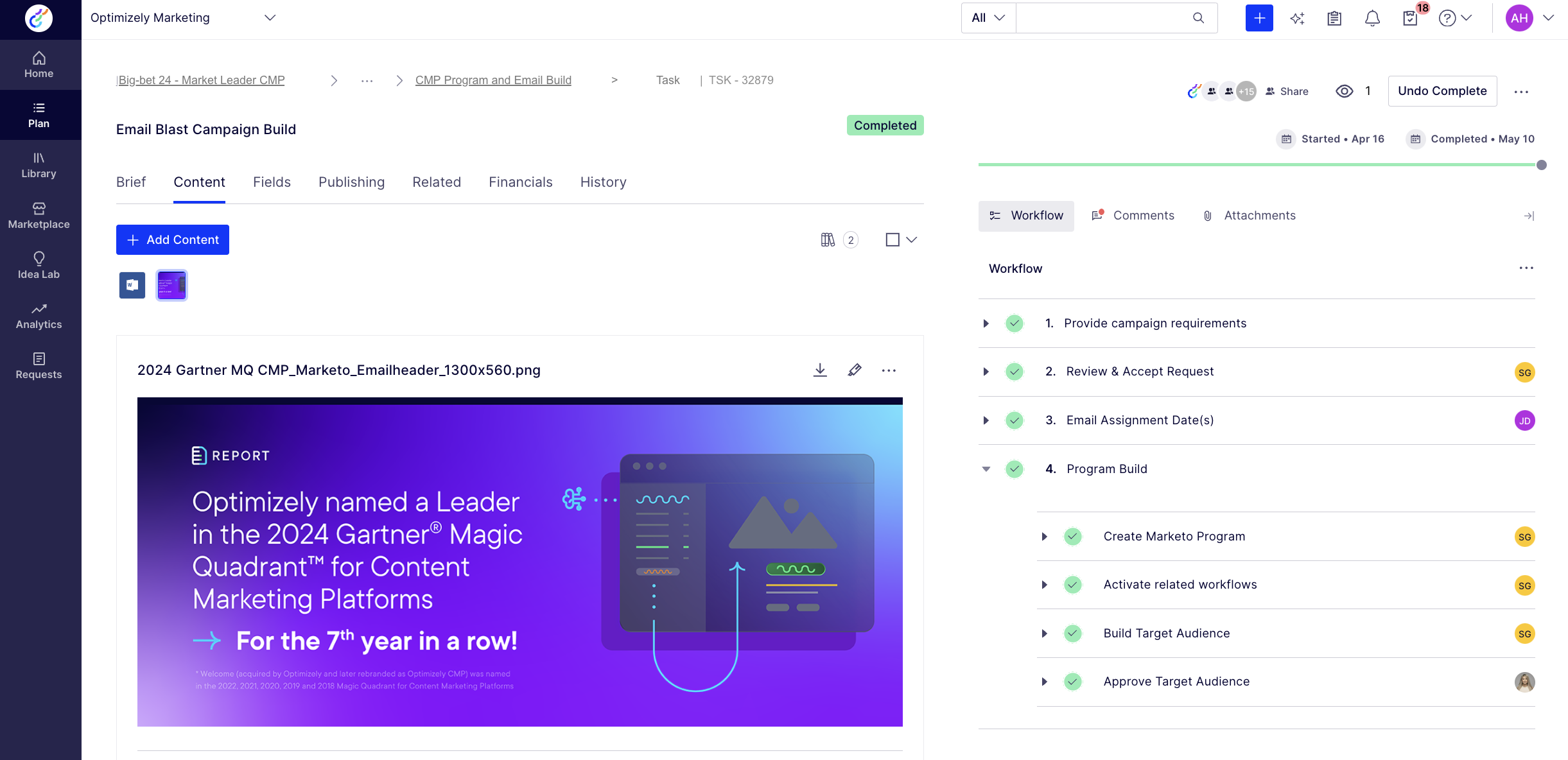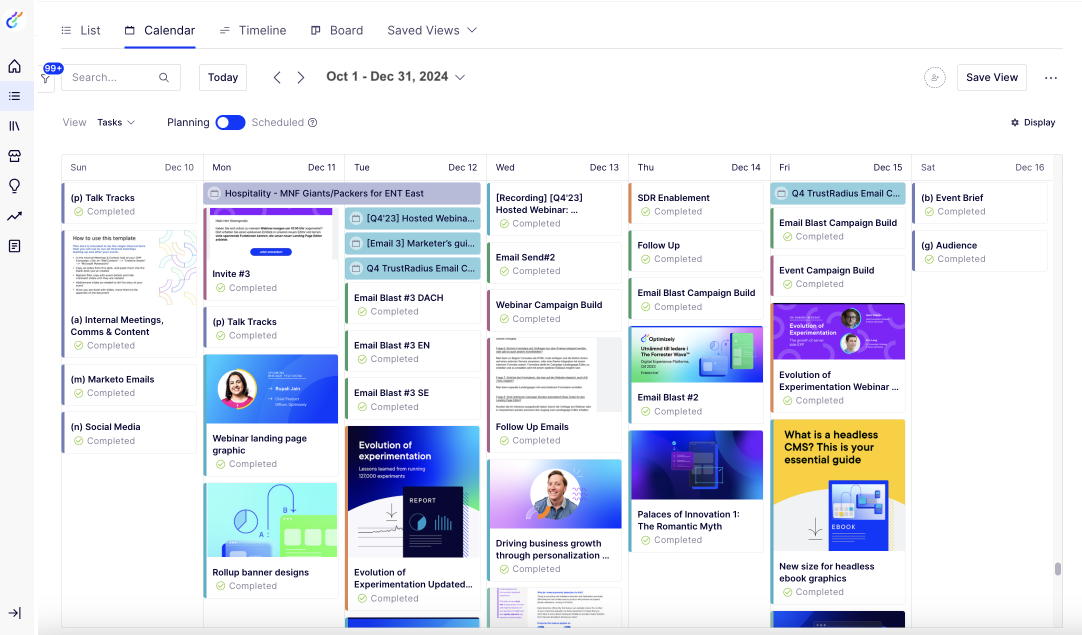From "wah" to "woah": How to improve your content creation process
Enough of the headaches with dodgy workflows, feedback blockers, and inconsistent publishing. Here's how to take your content creation process from 😭 to 😮, keeping quality high and quantity higher.


Sometimes we're all about quality over quantity, sometimes we're more about quantity over quantity.
What about the best of both worlds? You know, quality AND quantity.
That's right, you don't need to settle for less. With a smooth, streamlined and sxc content creation process, you can create high-quality content faster... meaning the quantity goes up too.
Find out how to improve your content creation process to 💫 transform 💫 your marketing effort, and psssst, collaboration and integration are your secret weapons.
-
Develop a clear content strategy
You wouldn't build a house on wonky ground, and the same works for building out your content marketing strategy. Before diving into creation, you want to establish a solid foundation.
That includes:
- Aligning with business goals: Every piece of content should serve your broader business objectives, whether that's increasing brand awareness, generating leads, or driving sales
- Knowing your audience like the back of your hand: Develop detailed buyer personas that include demographics, pain points, and content preferences
- Establish your content pillars or themes: Create core themes that align with your expertise and audience interests, ensuring consistency and authority in your chosen areas
-
Create a more integrated marketing workflow
We go on about integrated marketing quite a bit (sorry, not sorry) but... a well-defined workflow is great for eliminating confusion and miscommunication, and therefore great at accelerating production.
With an efficient workflow and project management tool like Optimizely Content Marketing Platform, you can:
- Map each stage of content development, from ideation to publication
- Assign clear roles and responsibilities to team members
- Track progress and see where everyone is up to (super easily)
- Set realistic timelines and milestones for each content piece
This not only makes the lives of your team easier, but really helps out other key stakeholders to get clued up where it's relevant to them, whether that's getting quick feedback from them or messaging input.

Image source: Optimizely Content Marketing Platform -
Encourage collaboration among teams
There's no "I" in "team", but you'll find both "I" and "team" in "marketing" (even if it's a little bit mixed up). Sure, marketing can include that independent thinking and work, but the real magic starts happening when you introduce teamwork and collaboration.
By encouraging more collaboration within your team and between teams in your organization, you break down silos and enrich your content. To boost teamwork, you can:
- Host regular cross-functional brainstorming sessions
- Invite input from other teams, like sales, customer service, and product teams
- Use collaborative tools like Microsoft Teams and Lucidspark
- Create channels for ongoing communication and idea sharing
Knock down those walls of marketing silos, and unlock new levels of creativity, quality, and productivity. ✨
-
Sort out that feedback process
We've all been there: the hard work is done, but your boss grimaces as they break the news "You're probably going to have to share this with X, X and X". 😬
Let's face it, those feedback processes can be a real blocker, bummer, and deadline-pusher. To prevent bottlenecks and maintain your marketing momentum:
- Establish clear feedback guidelines and expectations
- Limit revision rounds to 2-3 per piece (because, seriously)
- Include only essential stakeholders in the review process
- Set firm deadlines for feedback submissions
Big hint: Efficient, organized and neat workflows are great for streamlining the feedback process.
-
Make the most of data and analytics
Baseless decisions on what content to create, topics to talk about, and when to do it will not get your hard work the credit it deserves. Data-driven decisions, on the other hand, absolutely will.
Here's how you can use data to guide your content decisions:
- Content performance: Monitor key performance indicators (KPIs) for each content type
- Audience engagement: Use tools like Google Analytics to track engagement metrics
- Content optimizations: Conduct regular content audits to identify top performers
- Reporting and forecasting: Share performance insights across teams to inform future strategy
Optimizely is a 8x Leader in CMPs!
-
Repurpose your content
We all want to maximize the value of our content, right? If you don't, you're probably in the wrong job. Content repurposing is all about squeezing all the juice out of one piece of content, and turning it into multiple, brand new content formats. You know, really making the most of your hard work.
Here's a run-through of what your content repurposing strategy could look like:
- Plan how each piece can be adapted for different formats (blog, video, social media)
- Create a distribution checklist for each content piece
- Coordinate with social media teams for optimal posting times
- Build relationships with industry partners for content sharing
- cross channel distribution
-
Keep up with a content calendar
Move over Kardashians, we're Keeping Up with the Kontent Kalendar instead. Marketers, let us tell you, it's 10/10 watch.
Stay organized and consistent in your content creation process with an always-being-updated content calendar by:
- Planning content themes months in advance
- Aligning publication dates with marketing campaigns and industry events
- Building in a bit of flexibility for trending topics and other timely content
- Using calendar tools that integrate with your project management system

Image source: Optimizely Content Marketing Platform And it doesn't have to be a time sink, conceivably you can create an editorial calendar in less than 10 minutes.
-
Save time with the right tools
There are a lot of marketing tools out there; in fact, the number of martech solutions has gone up a huge 76% since 2020. But when it comes to content creation, there are a few tools that marketers can't really do without.
Equip your team for success with the following tools and training:
- Content management system (CMS): For easy publishing and collaboration
- Project management system or content marketing platform (CMP): For workflow tracking
- Reporting and analytics tools: For performance measurement
Oh, and please (pur-leeeeease) do not forget to include—or ask for—comprehensive training for your team on each of the tools. Make sure everyone is clued up on how to use the tools, otherwise processes won't be as efficient as it could be and your martech stack could be using up more budget than it needs to.
-
Continuously improve and iterate
Given we're in a time and landscape when things are constantly changing, it's important to understand that everything will change with it... including that content creation process. No matter how good you get it, it's critical to keep looking into and evolving your process to make sure it's still at its best.
We'll throw some ideas at you on how to spot where improvements or iterations are needed in your content creation process:
- Schedule regular process review meetings or retros
- Gather feedback from team members at all levels
- Stay current with industry trends and best practices
- Test new tools and approaches regularly
Remember, improving your content creation process is a journey... not a destination. 👈 Talk about profound.
Content creation template
We can't go on about the perfect content creation process without a template, can we?
Go head to our content creation template to find out some very interesting stats, what a (proven) successful content creation template looks like, and why a Content Marketing Platform like Optimizely might be the puzzle piece you're missing.
The power of a more integrated approach
The most successful content marketing strategies don't exist in isolation. True magic happens when teams work together, sharing insights, resources, and goals. By breaking down silos and fostering collaboration, you create an environment where creative ideas flourish and content truly resonates with your audience.
The result? A more efficient, collaborative, and successful content marketing operation that drives real business results. When marketing teams work together seamlessly, they create content that not only reaches its target audience but genuinely engages and converts them. Building an integrated marketing strategy can help set the foundation for this collaborative success.
Ready to transform your content creation process? Start with one step today, and build from there. Your future self—and your audience—will thank you.

